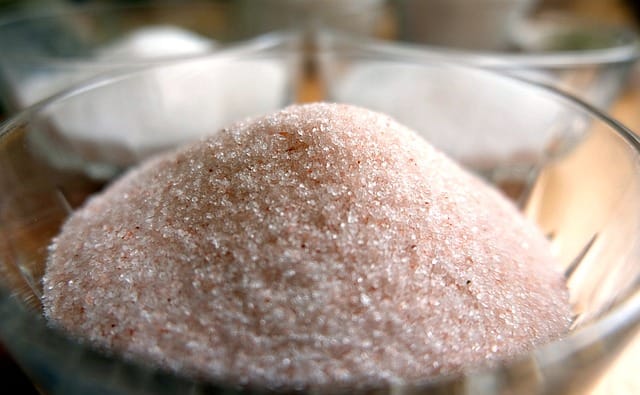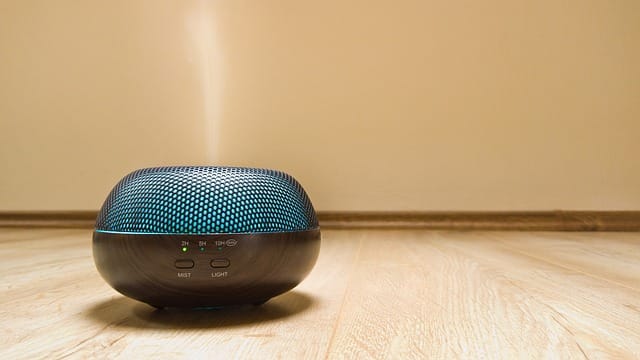Halotherapy (also known as salt therapy) can often be considered as a form of treatment for respiratory conditions, but in truth it has many more applications.
Used as early as the 12th century, [1] it was discovered that visiting salt mines was beneficial in a therapeutic manner, helping individuals with many ailments – both physical and mental.
Ever since the 1800s it has been used in a more focused manner, with individuals entering these caves or breathing air with salt particles (often in spa-like settings) to achieve various benefits.
Though this may seem like a very niche therapy, or one that may only be beneficial in specific circumstances i.e., to treat respiratory issues, halotherapy actually has far more uses and implementations than many individuals may think.
This blog post aims to explore this, in terms of addiction, rehabilitation and treatment, as well as the other implementations that halotherapy may have in the modern world.

As well as the different environments in which an individual may partake in halotherapy, there are also additional categories and forms of halotherapy. [2]
Most often partaken in within a ‘salt room’ or ‘salt cave’, this can be broken down further.
The two most well-known and implemented methods are listed below:

So why is breathing in salt so effective in treating a range of health issues?
First discovered by Polish salt mine workers who had excellent health despite poor working conditions, the link was quickly made between the salt that they worked around and their relatively lower rates of illness including colds and other respiratory illness that were heavily reported at the time. [3]
From a scientific point of view, it has since been discovered that the salt breathed in within these mines had bactericidal properties, as well as acting as an anti-inflammatory and moistening treatment.
When considering the struggles of respiratory illnesses, many of which are co-occurring within individuals struggling with addiction, these qualities make them especially soothing and medicinal.
This is explored further across the following subheadings.

Many individuals who struggle with addiction may also find themselves struggling with respiratory issues.
This is not only due to a general lowering of health and wellbeing, but it can also be directly linked to specific substances.
For example, cocaine and cannabis are two common substances that are heavily linked with the respiratory system, meaning that recurring and heavy consumption of these substances can lead to respiratory illnesses and infections.
As well as being snorted, cocaine can also be smoked, leading to serious health complications.
Research has shown links between cocaine and respiratory issues, including bronchiolitis and asthma, as well as serious infections of the nasal cavity and sinuses.
This shows how respiratory-based treatments, when used in combination with other suitable treatment methods, may be beneficial for individuals struggling with addiction.

Also cited as a bactericidal compound, salt is known to reduce the chance of infection when used as a method of treatment.
This is also beneficial for individuals who may be struggling with addiction – it is a disease that can seriously impact the individual’s immune system and therefore their ability to fight off other diseases and infections.
In the past, there have been links drawn between the immune system and addiction, [5] suggesting that a poor immune system may increase the likelihood of an individual turning to addiction, especially when combined with additional factors such as stress and environment.

Addiction is known to have a serious impact on the individual’s mental health as well as their physical health and can be especially stressful for some individuals.
For example, individuals who may be trying to reduce their substance consumption (i.e., begin to overcome their addiction) may feel additional stress and pressure – something which can seriously impact their journey to recovery, as well as their likelihood of maintaining sobriety in the long term.
Halotherapy may be especially useful during the detox stage in this respect, as it may help reduce the stress and pressure that an individual may experience mentally as they attempt to withdraw from the substance that they are addicted to.

From these select benefits of halotherapy, it has been shown that this form of treatment can be effective across various stages of addiction and rehabilitation, in both areas – mental and physical.
However, it is important that individuals undergoing treatment for addiction consider a wide range of treatments for the various effects and drawbacks that they are experiencing – not just halotherapy itself.
Although beneficial for some individuals, it is never recommended that individuals put all of their effort and motivation to recover into just one form of treatment.
Instead, it is important that they partake in a wide range of different therapies, or those that cover a wide range of effects of addiction.
For example, an individual who has been addicted to cocaine may choose to partake in halotherapy for their respiratory issues associated with long-term cocaine use, but it is also vital that they partake in therapies such as Cognitive Behavioural Therapy (CBT) which are aimed at the mental aspect of their addiction.
Before beginning any form of treatment for an addiction, it is important that individuals discuss their plan with a medical professional, remain open to trying a range of treatments, and remain motivated and focused on their own journey to recovery.

As with all forms of treatment, there is a chance that individuals who partake in halotherapy may experience a range of different risks.
For example, it is not recommended that individuals with some specific physical or mental health problems partake in halotherapy.
Below are a few examples of the disorders/complications that may make someone unsuitable for this form of therapy: [6]
Please bear in mind that this list is not extensive, and that there are many other factors which may impact an individual’s suitability for treatment.
Please speak to a medical professional before initiating holistic therapies such as halotherapy.

As well as the two different methods of halotherapy implementation (active salt and passive salt rooms), there are also two further ways in which the salt ‘consumption’ itself may be further broken down.
The most common and most relevant to this blog in particular is dry salt therapy, involving the inhalation of tiny salt particles – either assisted by a halogenerator or not, depending on the specific situation and treatment programme.
The other method in which halotherapy may occur is wet salt therapy.
This is where an individual may be more ‘hands on’ with the salt and the methods of which it enters the body.
Bathing in a salt-enriched bath, for example, is one of the most common methods in which wet salt therapy is carried out, but it can also be achieved by gargling or drinking salty water, as well as passing salty water through the nasal cavity.
In all instances, it is essential that individuals gain medical advice on these forms of halotherapy, as well as explore all their options based on their current need for treatment.

As mentioned throughout this blog post, halotherapy can be beneficial for many individuals.
Though primarily thought of as a treatment for respiratory issues and mental well-being, halotherapy can actually be used in a wide range of medical situations.
However, due to the equipment, infrastructure, and general tools needed to implement this form of therapy, it is not as readily suggested as some other forms of treatment – especially when it comes to addiction.
In these cases, and if the individual feels as though it may be beneficial for them, it is vital that this is brought to the attention of addiction and rehabilitation treatment providers.
Some rehabilitation centres, for example, may or may not have access to these forms of treatment, meaning that an individual’s choices may be limited or restricted should this be a form of care that they are seeking.
Call Rehab 4 Addiction today to find centres that are most suitable for you and your needs and requirements.

For addiction, halotherapy can provide both physical and mental health benefits, though this may not be suitable in every case.
Certain co-occurring health issues may make halotherapy a better or worse option for each individual case, meaning that it must be carefully analysed, and the individual must be completely honest about their experiences of addiction and any additional health issues that they have experienced as a result of this.
The following subheadings outline a few common health issues that may be impacted in a positive manner as a result of successful halotherapy.

With modern levels of pollution and the increasing number of dangerous particles that are being released into the atmosphere, it is no wonder that respiratory illnesses are on the rise in high-density and industrial areas of the world.
Asthma is one of the most common of these disorders, heavily impacting the lungs and their ability to function normally in specific circumstances.
In the UK, it is estimated that 1 in 12 adults and 1 in 11 children struggle with asthma, [7] though the severity of these conditions may vary massively.
Though many individuals rely on treatments such as inhalers and breathing equipment, it may be suggested that these individuals could try halotherapy as an alternative treatment type.
This is also important as long-term substance use and addiction has been linked to the acceleration of the decline in lung functioning, [8] increasing the likelihood of life-threatening asthma attacks, and greater asthma mortality in general.

Bronchiectasis is a condition affecting the lungs that widens the airways, meaning that there is a greater likelihood of mucus buildup and therefore an increased risk of infection.
With halotherapy’s (and salt’s – specifically) immune system effects, this may be increasingly effective, with the bactericidal and anti-inflammatory qualities assisting in direct ways.
By reducing the risk of bacterial infections, bronchiectasis may be far more effectively treated and individuals may suffer far less than those who do not treat the condition with similar treatments.
A small study found strong links between bronchiectasis and heroin consumption, [9] showing that halotherapy may be extremely effective when combined with other treatment types, especially when used in suitable situations and when properly monitored, altered, and adhered to over the total treatment programme.

Halotherapy is just one of countless different treatment types that is suitable not just for those struggling with different forms of addiction, but also for those who may be struggling with additional physical and mental health issues.
To learn more about whether halotherapy is suitable for you or someone you know, as well as other suitable treatment types, please do not hesitate to get in contact with Rehab 4 Addiction today.
Specialising in matching individuals to the most suitable form of rehabilitation treatment for them, Rehab 4 Addiction will handle any request, enquiry, or questions with the utmost of confidentiality, professionalism and lack of judgment.
To get in touch with a member of our friendly team, call us for free on our addiction hotline at 0800 140 4690
[1] https://www.webmd.com/balance/what-is-halotherapy
[2] https://www.salttherapyassociation.org/types-of-salt-therapy
[3] https://thesaltscene.com/is-salt-therapy-safe-and-effective-for-asthma/
[4] https://pubmed.ncbi.nlm.nih.gov/1589607/
[5] https://www.ncbi.nlm.nih.gov/pmc/articles/PMC3860409/
[6] https://www.webmd.com/balance/what-is-halotherapy
[7] https://www.asthmaandlung.org.uk/conditions/asthma/what-asthma